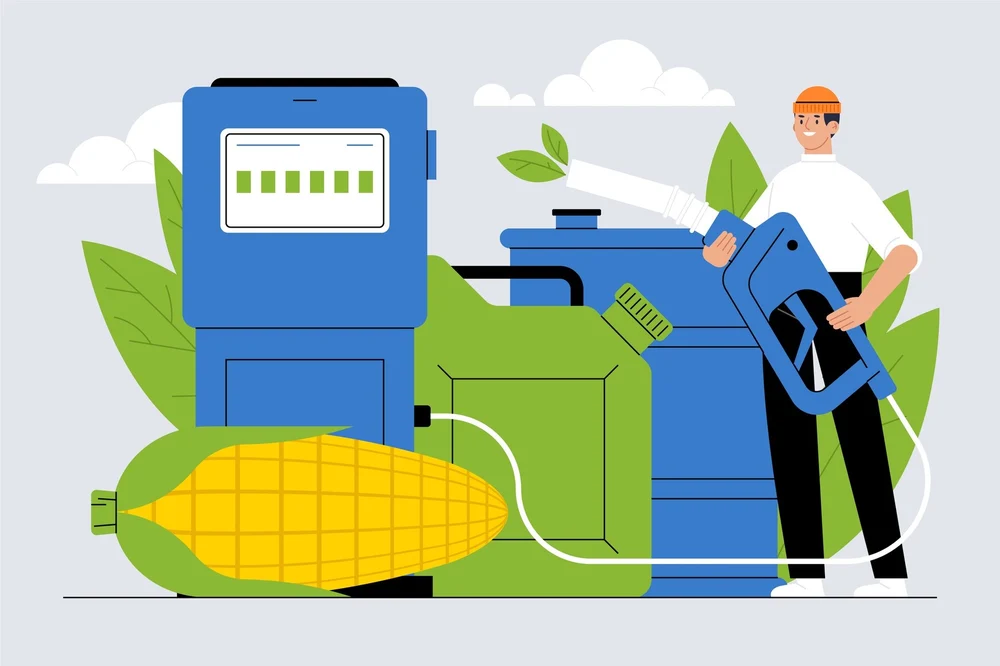
How Biodiesel is Transforming the Automobile Industry
The automobile industry is undergoing a significant transformation as the world seeks alternatives to traditional fossil fuels. As concerns about environmental sustainability and the impact of greenhouse gas emissions grow, biodiesel has emerged as a promising solution.
This eco-friendly fuel, deriv from renewable resources, is not only helping to reduce emissions but also reshaping the way vehicles are powered. In this blog, we will explore how biodiesel is transforming the automobile industry, the benefits it offers, and the challenges it faces.
Understanding Biodiesel
What is Biodiesel?
Biodiesel is a renewable fuel made from natural sources such as vegetable oils, animal fats, or recycled cooking oil. Unlike traditional petroleum diesel, biodiesel is produc through a process called transesterification, which separates glycerin from the fat or oil, resulting in a cleaner-burning fuel. It can be used in its pure form or blended with petroleum diesel in varying proportions, offering versatility for different types of vehicles.
Types of Biodiesel
Biodiesel is categorized by its blend percentage with traditional diesel:
- B5: A blend containing 5% biodiesel and 95% petroleum diesel.
- B20: A more common blend with 20% biodiesel and 80% diesel.
- B100: Pure biodiesel, which can be used in some engines but may require modifications to perform optimally.
Each blend has its specific applications, performance characteristics, and environmental benefits, allowing flexibility for vehicle owners and industries.
Environmental Benefits of Biodiesel
Reducing Greenhouse Gas Emissions
One of the most significant advantages of biodiesel is its ability to reduce greenhouse gas emissions. When biodiesel is burned, it emits fewer carbon dioxide (CO2) emissions than traditional diesel. Since biodiesel is made from renewable resources like plant oils, the carbon released during combustion is balanced by the carbon absorbed during the plants’ growth, resulting in a lower overall carbon footprint.
Renewable and Sustainable Fuel Source
Biodiesel is a renewable resource, meaning it can be produced from plant-based or recycled materials. This helps reduce dependency on non-renewable fossil fuels, making it a more sustainable energy source. As biodiesel production continues to expand, countries can improve their energy independence, reducing reliance on imported petroleum and promoting local agriculture.
Biodegradability and Reduced Toxicity
Unlike petroleum-based fuels, biodiesel is non-toxic and biodegradable. This means that in the event of a spill, biodiesel breaks down quickly and does not pose a significant threat to the environment. The reduced toxicity of biodiesel also means fewer harmful emissions like sulfur oxides and particulate matter, contributing to cleaner air quality.
Impact on Vehicle Performance
Engine Compatibility
Modern diesel engines are typically compatible with biodiesel blends, particularly B5 and B20, without requiring any modifications. Many automakers are increasingly designing engines to handle biodiesel, making it easier for consumers to transition to renewable fuel options. For older vehicles, retrofitting options are available to ensure smooth operation with higher biodiesel blends like B100.
Improved Lubricity and Engine Longevity
Biodiesel offers superior lubricity compared to traditional diesel, which can lead to reduced engine wear and longer engine life. Improv lubricity means that engine parts are better protected from friction, minimizing wear and tear over time. This not only extends the life of the vehicle but also reduces the need for costly repairs and maintenance.
Cold Weather Performance
One of the challenges with biodiesel is its tendency to gel at low temperatures. In colder climates, biodiesel can solidify, making it difficult to use. However, various additives and modifications to the biodiesel production process can improve its cold weather performance. Solutions such as blending biodiesel with petroleum diesel or using specially formulated cold-weather biodiesel blends help mitigate these issues.
Economic Impacts of Biodiesel Adoption
Cost Competitiveness with Traditional Fuels
Biodiesel has become more cost-competitive with petroleum-based fuels in recent years, particularly as the price of fossil fuels fluctuates. Although biodiesel can be more expensive to produce due to the cost of raw materials and the production process, long-term financial benefits include reduced maintenance costs, longer engine life, and the potential for government subsidies and incentives for using renewable fuels.
Job Creation and Automobile Industry Growth
The rise of biodiesel has spurred economic growth, particularly in rural areas where biodiesel feedstocks such as soybean, canola, and other oilseeds are produc. The expansion of biodiesel plants has created jobs in agriculture, production, and distribution, providing a boost to local economies.
Additionally, Biodiesel Production Plant Manufacturers & Suppliers are playing a critical role in developing the infrastructure needed to support the growing biodiesel industry.
Government Incentives and Tax Benefits
Governments around the world are offering incentives to encourage the adoption of biodiesel. These incentives include tax breaks, grants, and subsidies for businesses and individuals who choose biodiesel over traditional fuels. In many cases, these government programs also support Biodiesel Processing Plant Manufacturers, ensuring the industry continues to grow and innovate.
Biodiesel’s Role in Reducing Fossil Fuel Dependency
Blending with Traditional Fuels
Biodiesel can be easily blend with petroleum diesel to reduce the consumption of fossil fuels without requiring significant changes to infrastructure or vehicle design. Blends like B5 and B20 are common in many countries, helping reduce overall fossil fuel usage while transitioning toward more sustainable energy sources.
Supporting Energy Security
The production of biodiesel from local resources such as crops and waste materials helps improve energy security. By producing fuel domestically, countries can reduce their dependence on foreign oil, stabilize fuel markets, and reduce vulnerability to global price fluctuations. Moreover, companies that create a bio diesel plant contribute directly to this goal by promoting local energy production and reducing transportation costs associated with importing fuel.
Challenges Facing Biodiesel in the Automobile Industry
Production and Supply Chain Limitations
While biodiesel offers numerous benefits, there are challenges to scaling up production. Sourcing feedstocks in sufficient quantities without negatively impacting food supplies remains a concern. Moreover, developing a reliable and efficient supply chain to transport raw materials and distribute biodiesel to fueling stations can be logistically complex, particularly in regions without established infrastructure.
Infrastructure and Distribution
The availability of biodiesel at fueling stations remains limited in some areas, making it difficult for widespread adoption. Expanding biodiesel infrastructure, including storage facilities and distribution networks, is necessary to increase accessibility for consumers and businesses. However, this requires significant investment and cooperation between governments, fuel providers, and biodiesel processing plant manufacturers.
Public Perception and Adoption Rates
Despite its benefits, biodiesel faces challenges in public perception. Some consumers may be hesitant to switch to biodiesel due to concerns about vehicle compatibility, performance, or availability. Additionally, there is still a lack of awareness about the advantages of biodiesel, both environmentally and economically. Addressing these concerns through education and marketing is essential for increasing adoption rates.
Future of Biodiesel in the Automobile Industry
Innovation in Biodiesel Production
The biodiesel industry is continually evolving with advances in technology. Researchers are exploring new feedstocks such as algae, which have the potential to produce biodiesel more efficiently and with a smaller environmental footprint. Innovations in production technology are also making biodiesel more cost-effective and scalable, benefiting both producers and consumers. Benefits of a bio diesel plant include the ability to adapt these innovations to increase production capacity and sustainability.
Integration with Electric and Hybrid Vehicles
While electric and hybrid vehicles are becoming more popular, biodiesel still plays a significant role in reducing emissions from the transportation sector. Biodiesel can be used in conjunction with hybrid vehicles, particularly in heavy-duty applications like trucks and buses, where fully electric options may not yet be feasible. The combination of biodiesel and hybrid technology provides a powerful solution for reducing emissions while maintaining performance.
Global Adoption and Policy Shifts
As countries set ambitious targets for reducing carbon emissions, biodiesel is becoming a key component of global energy strategies. Governments worldwide are implementing policies to promote renewable fuels in transportation, with biodiesel playing a central role in achieving these goals. The continu support for biodiesel at the policy level is expect to drive further adoption and innovation in the Automobile Industry.
Conclusion
Biodiesel is transforming the automobile industry by providing a cleaner, renewable alternative to traditional fossil fuels. Its environmental benefits, such as reduced emissions and biodegradability, make it a crucial player in the transition to a more sustainable future. Additionally, biodiesel offers economic advantages, including job creation and energy security, as well as opportunities for innovation and growth in the fuel production industry.
However, challenges such as production limitations, infrastructure development, and public perception must be addressed for biodiesel to reach its full potential. With continued investment in technology and infrastructure from biodiesel production plant manufacturers & suppliers and support from governments, biodiesel is poised to play a major role in shaping the future of transportation.
As we move toward a more sustainable world, creating a bio diesel plant and adopting biodiesel as a mainstream fuel source will become essential for reducing carbon emissions and ensuring the longevity of our energy resources. The benefits of a bio diesel plant are clear: cleaner air, sustainable energy, and a brighter future for the automotive industry and the planet.



